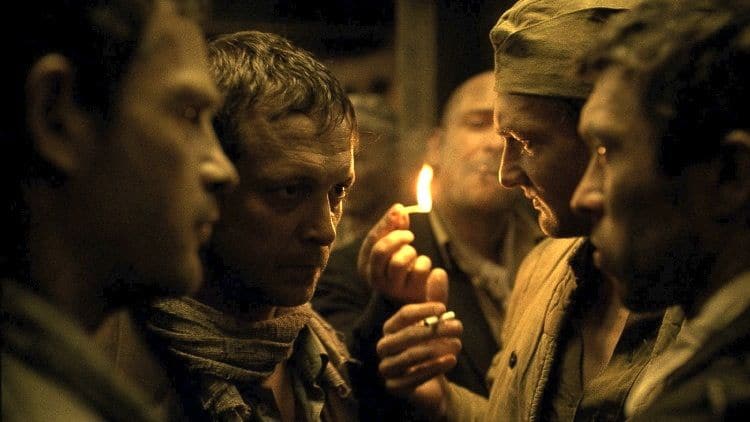Directed by first timer László Nemes, Son of Saul focuses on a subgroup of prisoners called Sonderkommando who were forced to help Nazis in their usage of gas chambers during WWII. Saul (Géza Röhrig) is one of these prisoners and during the first third of the film he performs his duties, including moving corpses and cleaning bloody gas chambers, without disdain or disgust. The single expression he shows is one of pragmatism, not horror. This continues until his priorities shift after he finds a certain body. Saul discovers his illegitimate son’s body and does everything he can to hide it from cremation so he can provide a proper burial.
The film focuses almost entirely on Saul. The camera closely follows him and there are very few cuts, similar to the shooting style of Birdman. Furthermore, Nemes chose to use the Academy ratio (not widescreen). Typically, using this technique in the modern era implies unnecessary nostalgia on the part of the filmmaker as was the case with The Artist, but here it is effective. Nemes uses the smaller area to create a strong sense of location. At any moment it feels like there is something chaotic occurring just off-screen, but we can’t tell because our focus is on Saul – literally. The backgrounds, particularly the most explicit ones, remain blurred and out of focus. These techniques successfully create a world beyond the frame of the film and show the banalization of tragedy. Dead bodies aren’t in focus because they’re not special and how can they be with so many around?
Yet the formal strengths of the film are undermined by its narrative turns. As Saul becomes increasingly desperate and endangers others to ensure the proper burial of his son, he becomes almost hypocritical. He takes risks that could potentially harm the escape plans his peers have worked so hard to execute just to save someone that has already been lost. And after sending hundreds of bodies to the incinerator, what makes his son’s body special? There is the famous quote by Joseph Stalin that “One death is a tragedy; one million is a statistic.” but here Saul’s actions only appear selfish, not tragic, and any small payoff that could have been produced is crippled by a cheap, cop-out of a conclusion.

Son of Saul recently picked up the Oscar for Best Foreign Language Film. Despite the Academy being averse to gruesome subjects, they have consistently shown they love movies about the Holocaust. Why? Maybe because it’s morally unambiguous. Maybe because it’s a time when the US was completely in the right and played the hero. Or maybe it’s just that people are too afraid of backlash to criticize a film based on the Holocaust, fearing that others will think they are belittling one of the greatest tragedies in history. It’s important to note that the film and its subject, no matter how important or sensitive, are separate from each other and criticizing one does not equal criticizing the other. Son of Saul is another example of a historical drama overrated by critics, likely due to its subject matter.

3/5 stars.
